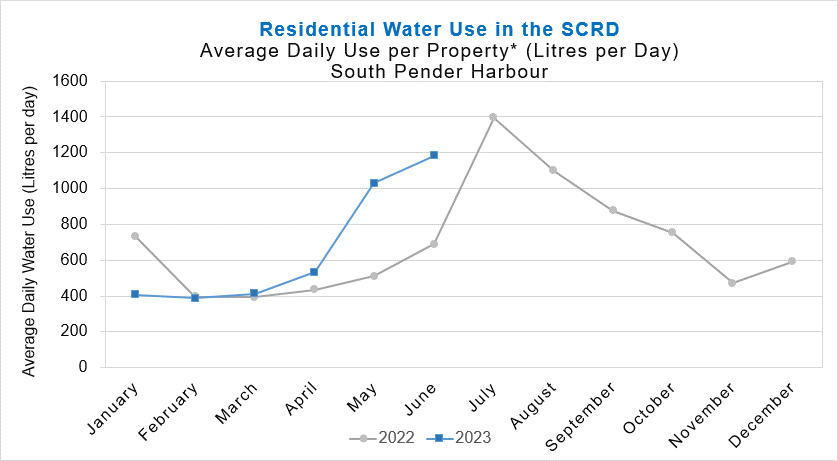As South Pender Water System clients adjusted to their first-ever round of Stage 3 outdoor water use restrictions on July 15, Sunshine Coast Regional District (SCRD) staff were on hand with an information booth about the situation. Two members of the regional staff were in the Madeira Park Shopping Centre’s parking lot for two hours with water conservation advice, brochures, user data and sign-up sheets for online residential water use updates.
One client signed up for their user reports during the two-hour outreach event and as of July 17 63 South Pender clients were registered for that service, the SCRD told Coast Reporter. The SCRD’s website indicates the system has 917 water clients.
Can South Pender's water supply be increased?
Personnel at the booth said that answering questions about how to add more supply to the system was outside of their scope but indicated information on that would be part of the next regional "water update." Those reports are presented at regular board or committee meetings attended by SCRD area directors. Upcoming dates for those are July 20 (as of July 19, not part of the posted agenda) and 27.
In June, Coast Reporter spoke with SCRD board chair Leonard Lee. In that discussion, he said he has asked staff about the opportunities to expand South Pender's water supply. Things he would like to see considered were changes to the SCRD's MacNeill Lake water licence and exploration of the potential to share supplies between the North and South Pender systems. While those discussions have yet to come before the board, Lee said he wanted to see efforts to bring more supply to South Pender within his current term as the area's director (ending in 2026). He also pointed out that connecting the two systems would need not only the board's OK but the approval of the impacted property owners.
Water demands double
Increased water demands were one factor that resulted in the Stage 3 call for the South Pender system. Those higher demands were pointed out in a graph on display in the info booth that showed that 2023 residential water demands on that system started climbing over 2022 levels in March. By June, draws on that system’s supply were at 1,200 litres per day per residential service; almost twice the level they were at in the same month a year earlier.
The bump up in use levels was also addressed in the July 13 “water update” by utilities department superintendent Codi Abbott. She said that while South Pender water use did go down slightly when Stage 2 water rules were introduced on June 9, demand levels had rebounded in early July. That resulted in the SCRD exceeding the allowed daily flows of 1.8 million litres, as permitted under its annual 663 million litre MacNeill Lake water licence, on "a number of" 2023 dates. Intake under that licence is the system's sole water source.
In further conservation efforts, SCRD staff were slated to use leak correlation equipment on its South Pender water infrastructure on July 13 and 14, “to see if we can find anything on our side” according to Abbott. In her update, she assessed that water losses from leaks on the local government’s portion of the piping were likely “small in comparison” to those occurring on private properties.
Supply recharge rates down
Another reason South Pender was placed on Stage 3 relates to conditions at the lake, where lower water replenishment levels are being experienced. MacNeill Lake “is now at September 2022 levels. We are two months ahead of last fall’s drought conditions” according to a July 17 email from communications officer Cecilia Garcia.
According to SCRD water staff, water re-supply has been impacted as a result of ongoing drought conditions as well as warmer than normal temperatures, being sustained over longer periods of time.
In the “water update” presentation, Abbott noted that MacNeill feeder source Harris Lake was no longer overflowing into Haslam Creek and not providing recharge water to the system.



